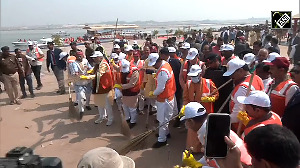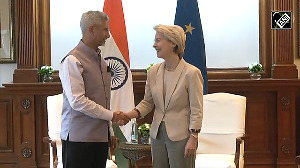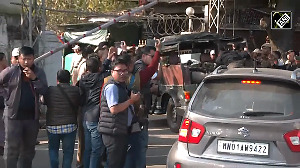East Bengal's unexpected triumph at the ASEAN Club Cup is beginning to sink in. But along with the satisfaction comes the question: How much will Indian football benefit from this rare success?
 A lot; not much. Opinion seems divided. However, all agree that a beginning has been made, and it is now up to the football administrators to take it on from here.
A lot; not much. Opinion seems divided. However, all agree that a beginning has been made, and it is now up to the football administrators to take it on from here.
Optimists like coach and former India star P K Banerjee say the state of affairs will change. Cynics insist once the celebrations are over, everyone will forget about it.
East Bengal coach Subash Bhowmick says his club should inspire a change in Indian football. "We have shown it can be done. Now let others follow it up."
So what did Bhowmick do that other clubs or the Indian national side haven't been able to do?
| The team | Click for pictures |
| Goalkeepers: |
| Sangram Mukherjee |
| Sandip Nandy |
| Defenders: |
| Deepak Mondal |
| Suley Musah |
| M Suresh |
| Mahesh Gawli |
| Midfielders: |
| Douglas da Silva |
| Surkumar Singh |
| Malswam Tulunga |
| Subhas Chakraborty |
| Chandan Das |
| Debjit Ghosh |
| Sasthi Duley |
| Kalia Kulothungan |
| Forwards: |
| Alvito D'Cunha |
| Mike Okoro |
| Bijen Singh |
| Baichung Bhutia |
| Coach: |
| Subash Bhowmick |
| Trainer: |
| Kevin Jackson |
| Click for pictures |
Stress on physical fitness, something that has been a gray area in Indian sport. Stress on psychological training, something that the Indian cricket team is opening up to with success. Stress on scientific coaching methods, something all coaches talk about, but fail to implement effectively.
Bhowmick got all of this right.
"If Subash Bhowmick can, and if the boys can deliver, why can't we expect a transformation in Indian football?" asks Chunni Goswami, widely considered the greatest Indian to play the game.
But for Indian football to transcend its mediocrity, the All-India Football Federation has to adopt a rigorous policy that will incorporate everything that Bhowmick invested into making the present East Bengal team and more.
That a scientific training regime, stress on physical fitness and an abundance of sincerity can produce results is clear from the Indian team's victory in the LG Cup in Vietnam under coach Stephen Constantine. But, maintaining the tempo, or consistency for that matter, has been a problem.
Bhowmick says that is because of the let-up in the tight regime that a champion team should follow.
"I insisted on having a physical trainer at least one month ahead of the ASEAN Cup because we must all realize the importance of fitness," he says.
|
Add to that Bhowmick's coaching skills and psychological training.
"The boys showed tremendous physical stamina and it is because of the stress that has been laid on fitness training," he says.
"The biggest achievement from the ASEAN Cup has been the change in attitude of the players -- that we too can win. The victory has induced in them a spirit of togetherness, a competitiveness that can come only by playing more often abroad.
"Remember, we beat the team that reached the final of the AFC League Championship last season. And all the boys realise that," Bhowmick says.
"We planned game by game, studying the strengths and weaknesses of each team. For the final, we had to do something different as we had lost to BEC Tero Sasana. I'll say the whole team contributed to the triumph."
But the coach has also sounded a warning: "Don't rest on your laurels."
Same with the physio: "You are not yet 100 per cent fit."
Both men believe keeping the players on their toes will ensure more success.
Jackson says the East Bengal players' fitness was just enough to surpass other ASEAN Cup teams, but "to do better at the international level, the boys still have to work hard."
The argument by some quarters that club football doesn't necessarily reflect the quality of a national team may not be entirely true because East Bengal's achievement is more of a triumph of Indian players than the three foreigners in the team.
Baichung Bhutia can score, while M Suresh, Mahesh Gawli, Debjit Ghosh, Shasti Duley and Alvito D'Cunha can build the moves and defend the citadel. Goalkeeper Sandip Nandy can make the crucial saves.
So, when we have these players and the best from the other clubs as well, why can't the Indian team click?
"We can of course, why not? Provided the players follow a strict regimen and the kind of commitment we saw in the East Bengal players in the ASEAN Cup," says Sailen Manna, former India captain.
This failure has pushed Indian football into an abyss. Without an effective support system (read an efficient AIFF), even a Subash Bhowmick or a Stephen Constantine will come a cropper.
East Bengal made it in the ASEAN Cup because the coach got what he asked for from the club.
"I got whatever I asked for. After that, producing the result was my problem," Bhowmick says.
Will the Indian football team coach get what he asks for from the AIFF to change the game's fortunes in the country?
The chances of East Bengal's triumph spelling success for Indian football will probably depend on the answer to this question.









 © 2025
© 2025